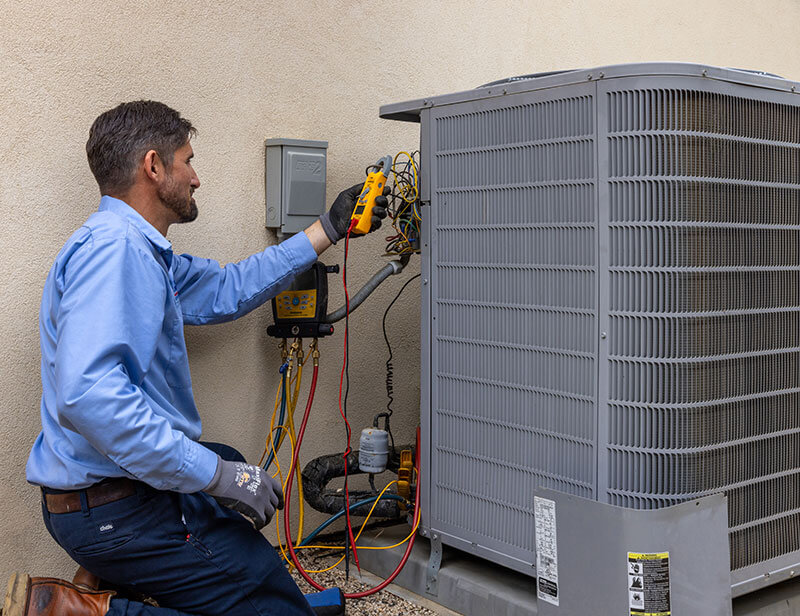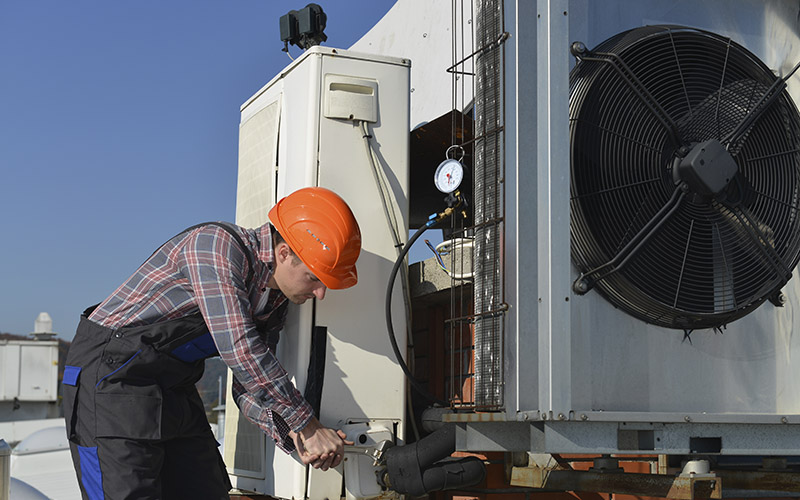Choosing Between a Heatpump and Heating System: Key Considerations for Your Heating And Cooling Requirements
When evaluating heating alternatives for HVAC requires, the choice in between a warm pump and a heating system can be complex. Each system supplies distinct benefits tailored to certain climates and energy effectiveness objectives. Understanding these distinctions is necessary for making an informed choice. Key variables such as setup costs and ecological impact further make complex the choice procedure. Which choice genuinely lines up with one's convenience and sustainability preferences? The following areas will certainly check out these factors to consider thoroughly.
Comprehending Heat Pumps: Exactly How They Function and Their Advantages
While numerous house owners think about various home heating alternatives, recognizing how warm pumps feature and their benefits can greatly affect their decision. Heatpump run by transferring heat as opposed to generating it. In the winter, they draw out warmth from the outdoors air or ground and transfer it inside, while in the summer, they reverse this process, cooling down the home by removing warm outside. This double performance makes them functional for year-round environment control.One of the key benefits of warm pumps is their energy effectiveness. They make use of considerably much less power contrasted to traditional furnace, potentially causing reduced utility expenses (heat pump installation ooltewah tn). Furthermore, warmth pumps have a smaller carbon footprint, making them an eco-friendly selection. They likewise call for much less maintenance than traditional systems, contributing to long-lasting expense financial savings. On the whole, recognizing the auto mechanics and advantages of heat pumps can help house owners make notified choices regarding their home heating and cooling needs
Checking Out Heaters: Kinds, Operation, and Benefits
Heating systems can be found in various types, consisting of gas, electrical, and oil versions, each with distinct functional mechanisms. Recognizing these differences is vital, as they influence effectiveness and home heating performance. Additionally, heaters offer numerous advantages, such as constant warm output and integrity in colder climates.
Kinds of Heating systems
Furnace can differ substantially in style and procedure, with heating systems being a popular selection amongst property owners. There are several kinds of heating systems, each utilizing various fuel sources and modern technologies. Gas furnaces are typical, leveraging all-natural gas to create heat effectively. Electric furnaces, on the various other hand, use electrical resistance to generate warmth, frequently preferred for their simple installation. Oil heating systems, while less usual, are efficient in areas with minimal gas gain access to (furnace replacement). Additionally, condensing heating systems make best use of energy performance by capturing and recycling exhaust gases. Each type runs through a system of warm exchangers and ductwork to disperse warm air throughout a home. Comprehending the differences between these heater types is vital for informed cooling and heating decisions
Benefits of Heating systems
For homeowners seeking dependable warmth during chilly months, the benefits of heating systems are significant. Heaters provide regular heating, making sure even temperature levels throughout the home. They are specifically effective in extreme chilly, usually surpassing heatpump in freezing conditions. Numerous kinds, consisting of gas, electric, and oil heaters, provide versatility to satisfy diverse requirements and preferences.Furnaces additionally often tend to have reduced first installment prices contrasted to heatpump, making them a more easily accessible alternative for many. Their durable style adds to a much longer life expectancy, with lots of devices lasting over 15 years with correct upkeep. In addition, contemporary heating systems are often equipped with advanced technology for improved performance, which can cause minimized power expenses. Generally, heaters remain a reliable option for effective home heating.

Power Performance: Comparing Warm Pumps and Furnaces
When contrasting energy efficiency between heatpump and heaters, the Seasonal Energy Performance Proportion (SEER) plays a vital duty in figuring out performance. Furthermore, an operational expense analysis exposes the lasting economic ramifications of each system. Understanding these factors can assist property owners in making notified decisions about their heating services.
Seasonal Power Performance Ratio
Energy performance plays an important function in the decision-making process in between warmth pumps and heaters, specifically when thinking about the Seasonal Energy Performance Proportion (SEER) This statistics procedures the cooling performance of heatpump over a whole cooling period, offering a standardized means to assess performance. Greater SEER scores indicate greater energy efficiency, equating to lower energy consumption and minimized energy expenses. On the other hand, heating systems are usually evaluated using the Annual Fuel Utilization Efficiency (AFUE) rating, which reflects home heating efficiency. When comparing these two systems, property owners ought to prioritize SEER ratings for heatpump, as they straight influence total energy savings and ecological sustainability. A complete understanding of SEER can especially affect the lasting satisfaction and cost-effectiveness of the selected a/c remedy.
Functional Expense Analysis
Recognizing the operational expenses related to heatpump and heating systems is essential for property owners assessing their options. Warm pumps usually use higher energy performance, converting electric power right into heat with minimal waste. This leads to reduced monthly utility expenses, particularly in moderate environments. On the other hand, traditional heating systems, particularly gas models, may have lower in advance prices but can incur higher functional expenses in time due to sustain prices and performance ratings.Moreover, heat pumps can function as both heating and cooling systems, possibly lowering the need for different HVAC devices. While initial financial investments for heat pumps might be greater, their long-term savings in power performance can make them a more cost-effective choice for numerous houses. Careful analysis of neighborhood energy rates is essential to figure out the most effective choice.
Setup Prices: What to Anticipate for Each Furnace
Installment costs for furnace can vary considerably between heatpump and heating systems, affecting property owners' decisions. Warm pumps usually have higher upfront installment costs, commonly varying from $3,500 to $8,000, relying on the unit size and complexity of setup. This consists of the exterior system, interior handling system, and essential ductwork alterations. Alternatively, furnaces tend to have reduced preliminary costs, averaging in between $2,500 and $6,000, which can be appealing for budget-conscious property owners. Installment expenses can boost if substantial ductwork is required.Moreover, the option of gas type for furnaces-- all-natural gas, propane, or electrical-- can likewise affect setup costs. While heat pumps supply energy efficiency, their first investment may hinder some buyers. Ultimately, examining setup costs along with long-term savings and performance will aid house owners in making notified choices regarding their home heating systems.
Environment Considerations: Which System Executes Much Better in Your Location
Just how do climate problems affect the performance of furnace? The efficiency of heatpump and furnaces can differ considerably depending upon the you could try here neighborhood climate. In modest climates, heat pumps stand out by successfully transferring heat from the outside air, making them an energy-saving alternative. Their efficiency decreases in exceptionally chilly temperature levels, where they may have a hard time to extract adequate warmth. On the other hand, heaters, especially gas versions, provide reputable and regular warmth no matter outside conditions, making them more suitable in cooler regions.In locations that experience milder wintertimes, heatpump can run efficiently year-round, giving both cooling and heating. On the other hand, regions with severe winter seasons commonly take advantage of the toughness of heaters. Eventually, understanding the regional climate is crucial when deciding in between a warmth pump and a furnace, as it straight impacts their functional performance and total performance.
Maintenance Needs: Long-Term Look After Warm Pumps vs. Furnaces
While both warm pumps and heating systems call for routine upkeep to assure peak efficiency, their specific demands and treatment regimens differ significantly. Furnaces commonly need less regular interest, with yearly inspections being sufficient to look for gas leakages, clean filters, and assess overall functionality. Their simpler design commonly enables uncomplicated repairs.In comparison, heatpump necessitate semiannual upkeep due to their double duty in heating & cooling. This consists of cleansing coils, inspecting refrigerant degrees, and making sure that both the outside and interior systems work at their ideal. Additionally, heat pump maintenance commonly involves even more intricate components, making specialist maintenance essential.Neglecting upkeep can bring about decreased effectiveness and enhanced energy prices for both systems. Ultimately, house owners ought to think about these lasting care requirements when picking between a heatpump and a heating system, as proactive upkeep can expand the life expectancy and efficiency of either system substantially.
Ecological Influence: Picking a Lasting Home Heating Alternative
The environmental effect of heater is a crucial assessment for house owners looking for sustainable choices. Heatpump are normally a lot more energy-efficient than typical heaters, as they move warm instead of create it, greatly minimizing carbon discharges. By utilizing renewable resource resources, such as air-source or geothermal warm pumps, property owners can further minimize their eco-friendly footprint.On the various other hand, all-natural gas heaters emit greenhouse gases and add to air pollution, though they often provide higher heat result. However, advancements in blog here modern technology have actually caused the advancement of high-efficiency heating systems that lessen emissions.Ultimately, choosing a heating unit involves weighing efficiency versus environmental impact. Property owners are encouraged to review neighborhood energy resources and rewards for renewable systems, guaranteeing a selection that lines up with both individual convenience and environmental duty. The decision influences not just instant convenience yet also long-term sustainability and ecological health.
Regularly Asked Concerns
For How Long Do Heat Pumps and Furnaces Generally Last?
The life-span of heatpump typically varies from 15 to 20 years, while furnaces can last in between 15 to 30 years. Routine upkeep substantially impacts their longevity and effectiveness in offering home heating services.
Can I Utilize a Heatpump in Very Cold Climates?
Heatpump can operate in incredibly chilly environments, but their effectiveness decreases as temperature levels drop. In such problems, supplemental heating resources might be required to preserve comfy interior temperatures and guarantee peak efficiency.

What Is the Noise Degree of Heat Pumps Versus Furnaces?
The sound degrees of heat pumps and heaters vary substantially. Usually, warm pumps operate more quietly than conventional heating systems, making them more suitable for those sensitive to appear, while heating systems may create louder operational sounds during home heating cycles.
Are Warm Pumps Suitable for Both Heating & Cooling?
Heatpump look at here now are undoubtedly appropriate for both home heating and air conditioning (heat pump replacement ooltewah tn). They operate by moving warmth, providing efficient temperature level control year-round, making them a versatile option for homeowners looking for an all-in-one heating and cooling remedy
What Size Heater Do I Required for My Home?
Identifying the ideal dimension heater for a home needs reviewing elements such as square video footage, insulation high quality, local climate, and the home's format. Consulting a professional can ensure an accurate analysis and optimal convenience. Heat pumps commonly use greater energy effectiveness, converting electrical energy into warm with very little waste. In modest climates, heat pumps excel by successfully moving warmth from the outdoors air, making them an energy-saving choice. Conversely, heating systems, specifically gas versions, provide trusted and consistent warmth no matter of outdoor conditions, making them better in cooler regions.In locations that experience milder winters, warmth pumps can operate efficiently year-round, offering both home heating and cooling. Heat pumps are generally much more energy-efficient than typical furnaces, as they transfer heat rather than generate it, considerably lowering carbon exhausts. By making use of renewable power resources, such as air-source or geothermal warmth pumps, property owners can additionally minimize their environmental footprint.On the other hand, all-natural gas heaters produce greenhouse gases and add to air contamination, though they frequently offer higher warm output.